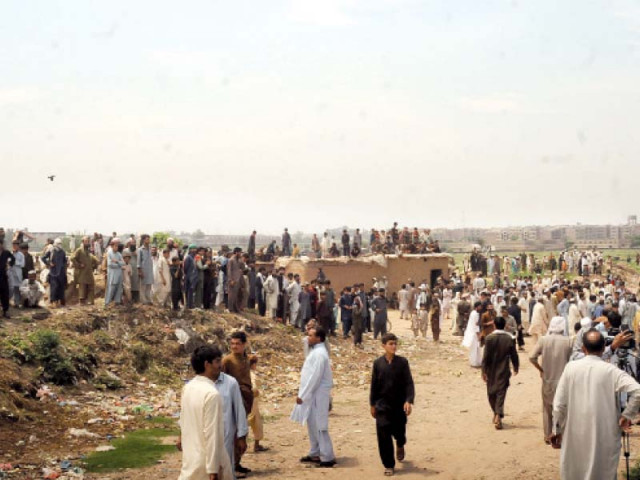Slum situation: In lieu of whole settlement, CDA to accept 250 plots
CDA about to offer settlement residents permission to keep many houses intact.

The 250 plots that CDA wants vacated cover an area of 13.1 acres. PHOTO: FILE
City managers are attempting to mitigate the fallout of an operation in the Afghan Basti in Sector I-11 by holding negotiations with its dwellers to vacate some of the land under adverse possession through mutual agreement.
Officials are now pushing the occupants to voluntarily vacate around 250 plots under their possession, in return for keeping occupation of the rest of the settlement.
The 250 plots in Sector I-11/1 were auctioned off long ago, but the CDA has failed to handover possession to owners as the dwellers have constructed their own mud houses there.
“We are offering a settlement to slum dwellers, but they have not accepted it yet,” said a senior CDA official who was part of the negotiations.
He said the CDA is due to present a report on the operation in Sector I-11 to the Islamabad High Court on Friday. “If the slum inhabitants agree and the CDA manages to get possession of some land, it should be enough to satisfy the court for the time being,” the official added.
The 250 plots cover an area of 13.1 acres.
Two separate meetings to discuss the issue were also held at the office of the interior secretary, and at CDA headquarters. The official said it had been decided to formally offer the 250 plot proposal to slum residents, and if they do not accept it, use of force would be the last resort.
In recent past, the CDA decided to hold an inquiry against CDA officials who served in the Katchi Abadi Cell and the enforcement directorate of the CDA between 2007 and 2013.
The Afghan Basti was previously cleared in 2005, following a massive eviction operation carried out by the CDA and the ICT administration on court orders. But by 2007, the slum had sprung up again.
The slum continues to grow, and in March 2013, the United Nations High Commission for Refugees (UNHCR) estimated that around 864 families comprising 7,995 individuals lived there.
Interestingly, the survey’s findings showed that the ‘Afghan Basti’ moniker is misleading, as there are only 114 registered and 27 unregistered Afghan refugee families — totaling 1,022 individuals or 12 per cent of the population — living in the slum. The other 6,973 people in the 2013 survey were either internally displaced persons from the Federally Administrated Tribal Areas (FATA), or migrant workers from Khyber-Pakhtunkhwa.
The last attempt to clear the slum was in 2013, when the CDA initiated its “Aman, Salamti aur Behtari” (peace, security and well-being) operation. The CDA and UNHCR had offered limited assistance packages to slum dwellers. But the operation was unsuccessful.
Awami Workers Party Islamabad Information Secretary Ammar Rashid told The Express Tribune that the CDA had been offering slum dwellers the opportunity to come to the negotiation table but noted that the offer had been communicated verbally and in the intimidating presence of bulldozers and security personnel, which is not acceptable.
“If [the CDA] is serious about holding negotiations, they should invite representatives of the katchi abadi in a respectable manner,” Rashid said.
CDA spokesperson Ramzan Sajid said the CDA’s operation against land grabbers would continue without fear or favour.
Published in The Express Tribune, July 29th, 2015.



















COMMENTS
Comments are moderated and generally will be posted if they are on-topic and not abusive.
For more information, please see our Comments FAQ